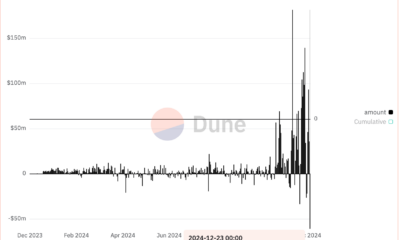Law and Order
OpenSea NFT Marketplace Hit With Class Action Suit Over Alleged Securities Sales
Published
3 months agoon
By
admin

The Moskowitz Law Firm filed another class-action lawsuit against a crypto firm Thursday, this time alleging that OpenSea’s customers were sold NFTs as unregistered securities.
The lawsuit brought in a Florida federal court claims that two residents of the Sunshine State sustained damages as a result purchasing NFTs on the platform, which served as a go-to place to purchase digital art and collectibles when the NFT market ran red-hot in 2021 and 2022.
“We have learned a great deal in our extensive crypto litigation,” Moskowitz Law Firm Managing Partner Adam Moskowitz told Decrypt in a statement. “With today’s ever-changing regulation, there should be a process to sell NFTs in a well-regulated environment.”
The Miami-based law firm is currently litigating against a wide range of crypto firms and their associates, including FTX and 11 celebrities who endorsed the collapsed crypto exchange. It has also sued basketball legend Shaquille O’Neal over his Solana-based NFT project Astrals, and soccer star Cristiano Ronaldo over his promotion of the crypto exchange Binance.
The latest lawsuit alleges that OpenSea engaged in a scheme “to mislead and deceive investors” while unjustly enriching itself by charging fees on NFT transactions. The Florida residents believed that NFTs traded on OpenSea were registered securities due to OpenSea’s representations, a copy of the case’s complaint shared with Decrypt states.
While the lawsuit does not list damages resulting from NFT purchases, it asserts that NFTs fall under the definition of a security as investment contracts. In various enforcement actions, the SEC itself has asserted similar claims, stating that NFT purchasers invested money in a common enterprise with the expectation of profit derived from the efforts of others.
Moskowitz’s lawsuit follows OpenSea’s disclosure of receiving a Wells notice in August, signaling that the Securities and Exchange Commission (SEC) is likely to sue the marketplace. On Twitter (aka X), OpenSea CEO Devin Finzer described the prospect of an enforcement action against OpenSea as a step into uncharted territory that puts artists at risk.
“The SEC [is] threatening to sue us because they believe NFTs on our platform are securities,” Finzer, a resident of Miami, said. “We should not regulate digital art in the same way we regulate collateralized debt obligations.”
As Finzer pointed out, NFTs can represent ownership in many things, including domain names, trading cards, and event tickets. Earlier this week, SEC Commissioners Hester Peirce and Mark Uyeda described the regulator’s approach to NFTs as “misguided and overreaching.”
Though the commissioners accused the SEC of an overzealous application of securities laws while targeting an NFT-gated restaurant chain, Moskowitz’s lawsuit argues that “the SEC’s stance on cryptocurrency has always been consistent.”
Last month, the law firm notched a partial win in its case against O’Neal, when a Florida judge ruled that the case could proceed on some accusations. In Thursday’s complaint, Moskowitz pointed to OpenSea as a platform where NFTs from O’Neal’s Astrals project were available.
OpenSea did not immediately respond to a request for comment from Decrypt.
Edited by Andrew Hayward
Daily Debrief Newsletter
Start every day with the top news stories right now, plus original features, a podcast, videos and more.
Source link
You may like


Solana beats Ethereum in a key metric 3 months in a row


SCENE’s 2024 Person of the Year: Iggy Azalea


BTC Risks Falling To $20K If This Happens


Most Layer 2 solutions are still struggling with scalability


Here’s why Stellar Price Could Go Parabolic Soon


Perp-Focused HyperLiquid Experiences Record $60M in USDC Net Outflows
Law and Order
Trump Picks Bo Hines to Lead Presidential Crypto Council
Published
18 hours agoon
December 22, 2024By
admin

Bo Hines, a former Republican nominee for the House of Representatives, has been named by President-elect Donald Trump to be the Executive Director of the Presidential Council of Advisers for Digital Assets.
Per a Truth Social post from Trump, Hines will oversee a “new advisory group composed of luminaries from the crypto industry” and work alongside David Sacks, Trump’s pick for the White House AI and Crypto Czar.
“In his new role, Bo will work with David to foster innovation and” growth in the digital assets space, while ensuring industry leaders have the resources they need to succeed,” Trump posted. “Together, they will create an environment where this industry can flourish, and remain a cornerstone of our nation’s technological advancement.”
Hines was the Trump-endorsed Republican House nominee in North Carolina’s 13th District in 2022, but lost the race to Democratic rival Wiley Nickel. During that race, Hines received backing from former FTX Digital Markets CEO Ryan Salame, who later went to prison for unrelated campaign finance law violations, among other charges.
The 29-year-old Hines ran again for the House this year in the state’s 6th District, but lost in the primaries, placing fourth among Republican candidates. He does not appear to have a substantial public history of making comments related to Bitcoin or cryptocurrency.
“Thank you, Mr. President! It will be the honor of a lifetime to serve in your next administration. Thank you for everything you have done and continue to do for our country,” Hines wrote on X (formerly known as Twitter) on Sunday. “I am thrilled to work alongside the brilliant David Sacks to ensure that this industry will thrive and remain a cornerstone of our nation’s technological advancement.”
Alongside Hines, Trump also named former Andreessen Horowitz venture capitalist Sriram Krishnan as the Senior Policy Advisor for Artificial Intelligence at the White House Office of Science and Technology Policy. Krishnan, who departed from the prominent VC firm in November, will also work closely with Sacks.
Daily Debrief Newsletter
Start every day with the top news stories right now, plus original features, a podcast, videos and more.
Source link
Law and Order
United States of Bitcoin? These States Are Considering BTC Reserves
Published
2 days agoon
December 21, 2024By
admin

Donald Trump and his political allies are plugging away at plans to stockpile Bitcoin at a national level in the U.S. Treasury.
And now, with the asset’s price repeatedly soaring to new peaks since Election Day, some U.S. states are following suit.
So far, three states are fielding proposals to establish strategic Bitcoin reserves, while digital asset advocates are calling for other local governments to do the same.
Here’s which states are considering topping up their coffers with the world’s oldest and most valuable digital currency.
Texas
Texas legislators will soon weigh in on whether or not they should establish a strategic Bitcoin reserve.
Texas State Representative Giovanni Capriglione proposed a bill in December that calls for the Lone Star State to create a Bitcoin stockpile.
The draft legislation stipulates that Texas must hold the Bitcoin for at least five years. The cryptocurrency must be kept in cold storage—that is, on some kind of a device that is not connected to the internet—and the assets cannot be used to make transactions outside of Texas, according to the bill.
“A strategic Bitcoin reserve aligns with Texas’s commitment to fostering innovation in digital assets and providing Texans with enhanced financial security,” the bill reads.
Finally, the proposal also enables Texans to donate to the state’s Bitcoin fund.
Pennsylvania
The Pennsylvania House of Representatives put forth a bill in November that called for the establishment of a strategic Bitcoin reserve.
Under the Bitcoin bill, Pennsylvania’s Treasurer would be able to buy Bitcoin with “up to 10%” of the State General Fund, Rainy Day Fund, and the State Investment Fund.
Tapping 10% of the State General Fund would allow the Pennsylvania Treasury to purchase nearly $1 billion worth of Bitcoin.
“Bitcoin, which has appreciated significantly over the years, can help Pennsylvania keep pace with inflation and economic change,” the state’s lawmakers said in a legislative memo published on November 12.
Ohio
Ohio State Representative Derek Merrin on December 17 proposed a bill to establish a strategic Bitcoin reserve in the Buckeye State.
The Ohio Bitcoin Reserve Act calls for the creation of a Bitcoin fund in the state Treasury. It also vests Ohio’s State Treasurer with discretionary power to purchase the asset.
“Ohio must embrace technology and protect tax dollars from eroding,” Merrin said Tuesday in an X post.
Although some details of how the reserve will work remain unclear, the draft legislation is expected to serve as a framework for Ohio lawmakers to build out in 2025.
Edited by Andrew Hayward
Daily Debrief Newsletter
Start every day with the top news stories right now, plus original features, a podcast, videos and more.
Source link
Law and Order
Hawk Tuah Girl Wakes Up, Plays Ball With Lawyers Suing Meme Coin Makers
Published
3 days agoon
December 20, 2024By
admin

After 372 hours, Haliey Welch, better known as the Hawk Tuah girl, has finally woken from her slumber to announce she’s made some new friends—namely, the same law firm that’s suing her business partners over her failed meme coin project.
Sixteen days ago, Welch’s would-be meme coin debut, a Solana token called HAWK, imploded at launch, enriching an apparently interconnected web of early investors and leaving most retail traders in the lurch. That evening, Welch told an irate audience on an X Spaces that she was going to bed and would see everyone in the morning—before going radio silent for weeks on end.
On Friday, Welch broke that silence by announcing she is cooperating with the law firm that sued the HAWK token’s creators Thursday for allegedly violating American securities laws.
I take this situation extremely seriously and want to address my fans, the investors who have been affected, and the broader community. I am fully cooperating with and am committed to assisting the legal team representing the individuals impacted, as well as to help uncover the…
— Haliey Welch (@HalieyWelchX) December 20, 2024
“I am fully cooperating with and am committed to assisting the legal team representing the individuals impacted, as well as to help uncover the truth, hold the responsible parties accountable, and resolve this matter,” Welch said on X (formerly known as Twitter).
A spokesperson for Welch told Decrypt that the influencer was “totally siloed” from the HAWK project and “had zero control over it.”
The spokesperson also asserted that Welch only received a fixed sponsorship fee for lending her likeness to the meme coin project, adding “there was no guarantee she would make any additional money from the meme coin thereafter.”
That story runs somewhat counter to one put forward earlier this week by the team taking responsibility for building most of HAWK. The crypto token launch platform OverHere said on Tuesday that it only took leadership over the doomed token because one of Welch’s associates, a mysterious figure known as “Doc Hollywood,” “vanished when things got hard.”
The OverHere team claimed it took zero fees from HAWK and made zero profit on the project, and pointed the finger at Welch and Doc Hollywood for an alleged lack of transparency.
The lawsuit filed Thursday against the project—by 12 American plaintiffs claiming to have suffered damages in excess of $151,000 from the project—listed OverHere as one of multiple defendants. It did not list Welch.
Alexandra Roberts, a law professor at Northeastern University, told Decrypt that she has never before seen a situation like this—in which a celebrity such as Welch has actively aided a lawsuit aimed at a project the celebrity lent their likeness to.
“I think it’s a great PR move,” Roberts said. “I think she’s trying to get out in front of it and make a really clear statement: ‘Not only did I not know what was going on, but I want to advocate on behalf of the people who were swindled.’”
Burwick Law, the firm suing HAWK’s creators, told Decrypt that it does not represent Welch, but is in conversations with her counsel.
When asked why Welch was not listed as a co-defendant in the HAWK lawsuit, Max Burwick, managing partner at Burwick Law, said the decision was intentional, and hinted it might help make his clients whole sooner.
“In this matter, we have chosen the strategy we believe to be most effective in helping our clients achieve meaningful results,” Burwick told Decrypt.
Edited by Andrew Hayward
Daily Debrief Newsletter
Start every day with the top news stories right now, plus original features, a podcast, videos and more.
Source link

Solana beats Ethereum in a key metric 3 months in a row

SCENE’s 2024 Person of the Year: Iggy Azalea

BTC Risks Falling To $20K If This Happens

Most Layer 2 solutions are still struggling with scalability

Here’s why Stellar Price Could Go Parabolic Soon

Perp-Focused HyperLiquid Experiences Record $60M in USDC Net Outflows

Experts say these 3 altcoins will rally 3,000% soon, and XRP isn’t one of them

Robert Kiyosaki Hints At Economic Depression Ahead, What It Means For BTC?

BNB Steadies Above Support: Will Bullish Momentum Return?

Metaplanet makes largest Bitcoin bet, acquires nearly 620 BTC

Tron’s Justin Sun Offloads 50% ETH Holdings, Ethereum Price Crash Imminent?

Investors bet on this $0.0013 token destined to leave Cardano and Shiba Inu behind

End of Altcoin Season? Glassnode Co-Founders Warn Alts in Danger of Lagging Behind After Last Week’s Correction

Can Pi Network Price Triple Before 2024 Ends?

XRP’s $5, $10 goals are trending, but this altcoin with 7,400% potential takes the spotlight
182267361726451435

Why Did Trump Change His Mind on Bitcoin?

Top Crypto News Headlines of The Week

New U.S. president must bring clarity to crypto regulation, analyst says

Will XRP Price Defend $0.5 Support If SEC Decides to Appeal?

Bitcoin Open-Source Development Takes The Stage In Nashville

Ethereum, Solana touch key levels as Bitcoin spikes

Bitcoin 20% Surge In 3 Weeks Teases Record-Breaking Potential

Ethereum Crash A Buying Opportunity? This Whale Thinks So

Shiba Inu Price Slips 4% as 3500% Burn Rate Surge Fails to Halt Correction

Washington financial watchdog warns of scam involving fake crypto ‘professors’

‘Hamster Kombat’ Airdrop Delayed as Pre-Market Trading for Telegram Game Expands

Citigroup Executive Steps Down To Explore Crypto
Mostbet Güvenilir Mi – Casino Bonus 2024

NoOnes Bitcoin Philosophy: Everyone Eats
Trending

 3 months ago
3 months ago182267361726451435

 Donald Trump5 months ago
Donald Trump5 months agoWhy Did Trump Change His Mind on Bitcoin?

 24/7 Cryptocurrency News4 months ago
24/7 Cryptocurrency News4 months agoTop Crypto News Headlines of The Week

 News4 months ago
News4 months agoNew U.S. president must bring clarity to crypto regulation, analyst says

 Price analysis4 months ago
Price analysis4 months agoWill XRP Price Defend $0.5 Support If SEC Decides to Appeal?

 Opinion5 months ago
Opinion5 months agoBitcoin Open-Source Development Takes The Stage In Nashville

 Bitcoin5 months ago
Bitcoin5 months agoEthereum, Solana touch key levels as Bitcoin spikes

 Bitcoin5 months ago
Bitcoin5 months agoBitcoin 20% Surge In 3 Weeks Teases Record-Breaking Potential


